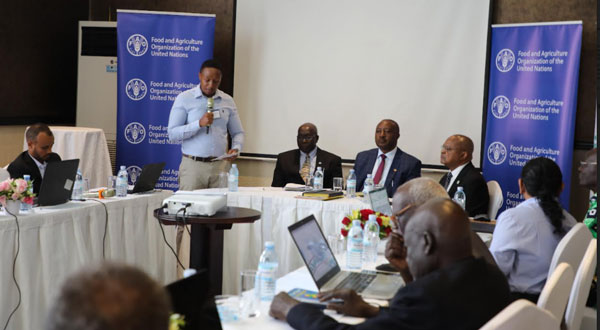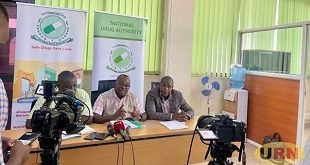
Kampala, Uganda | PATRICIA AKANKWATSA | Experts from the Food and Agriculture Organisation Sub-regional Office for Eastern Africa (FAO SFE), the Intergovernmental Authority for Development (IGAD), as well as global actors on biological controls, on June 27th held a consultation meeting on the uptake of biological control and the use of biologicals for management of pests of plants in Eastern Africa.
While speaking at the meeting, Charles Owach, the assistant FAO representative/Programmes in Uganda said that embracing ecological approaches to pest management is crucial to enhancing food security and nutrition and safeguarding environmental and human health. Biological control and biopesticides can effectively manage plant pests and contribute positively to agricultural production and productivity in Uganda.
“This sub-regional consultative meeting involving a multi-disciplinary team of senior officials from nine countries in Eastern Africa should galvanize various thoughts to look at the challenges and benefits associated with using biological control and bio-pesticides in pest management. This is important, relevant, and timely given Uganda’s pest and disease status quo and current food insecurity situations,” Owach said.
“I hope the meeting will not only look at opportunities and challenges for the uptake of biological control and biologicals in the management of field pests but also consider the potential of biologicals for the management of pests that damage crop commodities after harvest,” he added.
Crop losses due to pests are increasing at an alarming rate, necessitating the use of Integrated Pest Management (IPM) strategies that are environmentally friendly and sustainable. The use of biological control agents is by far the most ecosystem-friendly, sustainable and cost-effective method of pest management.
Using biological control and biologicals in pest management in agricultural production is an approach to reducing synthetic chemical pesticides and the associated adverse effects on human health and the environment.
However, the uptake and use of biological pest control measures are constrained by various factors that need to be addressed to realize its potential in Eastern Africa, including; Inadequate knowledge and awareness, the lack of appropriate infrastructure and resources to support the implementation of biological control, the presence of complex agro-ecological systems in Eastern Africa can make it difficult to predict the efficacy of biological control agents in different environments, and the weak regulatory frameworks to ensure the safe and effective use of biological control agents.
According to David Chimimba Phiri, the Subregional Coordinator for Eastern Africa (SFE) and FAO representative to the African Union (AU) the continued reliance solely on conventional methods of pest management such as the use of chemical pesticides has proved to be insufficient for prolonged suppression of pest problems and also harmful to the environment and human health, making it imperative that we seek alternatives that are environment friendly and do not pose risks to human health.
“By utilizing natural enemies of pests, such as predatory arthropods and beneficial microorganisms, we can mitigate pest problems and restore the delicate balance of ecosystems, in the process protecting the health of crops in a sustainable manner,”
“Biopesticides, derived from natural sources, offer attractive alternatives to synthetic chemical pesticides. Biological control and the use of biopesticides contribute to minimizing the risks associated with conventional chemical pesticides,” he added.
Stephen Byantwale the Ag. director of crop resources at the Ministry of Agriculture said that the engagement was timely and welcome since crop losses due to pests and diseases have continued to impact negatively on trade in plants and plant products including interceptions due to the presence of harmful organisms in commodities.
“Government has adopted measures including Integrated Pest Management (IPM) with some success. Experiences have been drawn from the use of Beetles to control water hyacinth, control of Maize Stalk Borers and recently biological control of the mango mealybug.
 The Independent Uganda: You get the Truth we Pay the Price
The Independent Uganda: You get the Truth we Pay the Price


